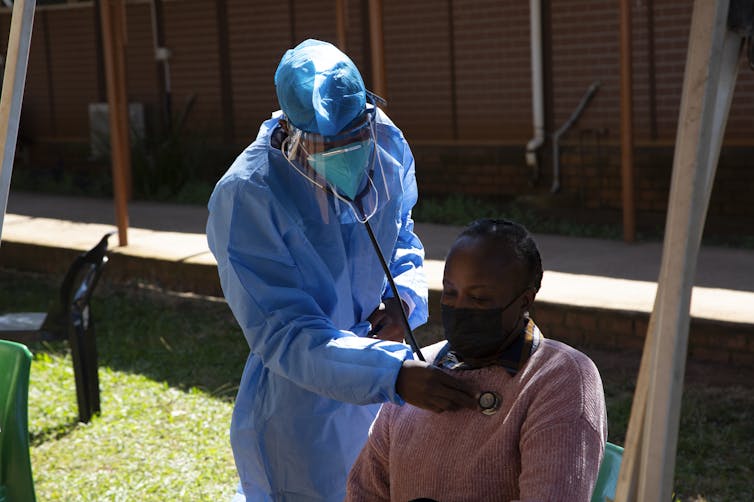
Rich countries are hoarding vaccine doses while poor countries become breeding grounds for new COVID-19 variants.
The World Health Organization’s COVAX — an abbreviation for COVID-19 Vaccines Global Access — warned that “no one is safe, until everyone is safe,” yet colonial attitudes are an obstacle to reining in the global pandemic.
COVID-19 has shown that global equity and inclusion are necessary to manage global crises. A major lesson from this pandemic is the need to decolonize transnational governance so that the world is better able to handle both future and current global crises and issues.
COVAX’s naïve failure
COVAX has failed.
It was supposed to provide vaccinations globally and equitably as well as serve as a mechanism through which both rich and poor countries would access vaccines. More than 80 per cent of the population in rich countries is fully vaccinated, compared to less than 10 per cent of the population in poor countries.
Credible reports say that poor countries have been affected the most by the global pandemic both in terms of how deadly it has been, as well as economically.
This summer, we’re seeing new pandemic waves in Europe and Asia driven by new SARS-CoV-2 variants first spotted in South Africa.

COVAX is based on lofty ideals of equity and social justice. The initiative has been necessary to moderately balance the gap between rich and poor countries that would have fared worse had it not been launched.
But COVAX has been called naïve for relying upon the good will of rich countries for funding and on their willingness to wait patiently in line for their own populations’ doses.
COVAX’s good intentions have had to co-exist with “might is right” politics. Rich countries made their own deals and bought large amounts of vaccine supplies before they were even available.
Vaccine nationalism turned COVAX into a broker of charity. The colonial mentality believes it’s OK to cut deals with Big Pharma for vaccine doses ahead of populous poor countries, and to charitably donate to them their soon-to-expire leftovers.
Read more: COVID-19 vaccine inequity allowed Omicron to emerge
Colonial mentality
Global capitalism as we know it emerged from a colonial world order set up for exploitation of people and lands. European countries kidnapped people from Africa and enslaved them as they dispossessed Indigenous Peoples. This created the extractive economy of today.
Racial classifications and racism have remained an enduring aspect of the modern world. Colonialism produced the initial and current gap between the rich and the poor world, and racialized the latter. When the mercantilist order of the colonial day morphed into capitalism in the 1800s, the colonial mentality that simply assumes European superiority remained.
This has been the basis for the colonial upper hand of the West and the United States in the type of transnational governance that emerged after the Second World War (the United Nations and Bretton Woods organizations, including the World Trade Organization, the International Monetary Fund and the World Bank). This has also been the basis for the colonial mentality of today.
COVAX was conceived during the rich World Economic Forum in Davos in January 2020. As news of the virus emerged from China, two professional white men sipped whisky and envisioned COVAX in a Swiss ski resort bar.

Seth Berkley (CEO of the Global Alliance for Vaccines and Immunization, or Gavi) and Richard Hatchett (CEO of the Coalition for Epidemic Preparedness Innovations, or CEPI), heads of global vaccination networks, discussed pandemic scenarios. They knew the world would need a funding and distribution strategy for shots, so they started thinking about a global solution.
Hatchett wrote a white paper in March 2020 and those ideas were the basis for the creation of COVAX in April that year. All this sounds great, but colonial mentality ultimately prevented the success of their initiative. It stopped COVAX from emerging as the co-ordinator of sorely needed 21st-century solidarity.
Decolonizing crisis governance
People rarely hear the names of Berkley and Hatchett in the global public sphere. Berkley’s Gavi is a global vaccine alliance that brings together the public and private sectors. Hatchett’s CEPI describes itself as a “global partnership between public, private, philanthropic, and civil society organizations.”
Today, these two global organizations — supported by the World Health Organization — are dealing with the enduring pandemic. But their transparency and accountability have been questionable.
Gavi designed COVAX without oversight and “with a small group of like-minded advisors, primarily Global North philanthropists, academics, and consultants,” according to a Doctors Without Borders report. The perspectives of low- and middle-income countries, civil society organizations or regional disease control groups weren’t considered in a meaningful way.
At the same time, pharmaceutical industry representatives have had a seat at the table of major decision-making discussions, and this has helped maintain the status quo of their intellectual property rights.
Read more: Peru's COVID-19 vaccine scandal shows the shady deals made with pharma companies
The world needs to move beyond myopic national self-interest. It has become apparent that in order to control the COVID-19 pandemic, equity and inclusion are urgently required.
Scientists anticipate there will be new pandemics along with climate change crises. This will hardly be the last global public-health emergency.
Out of self-interest, transnational governance needs to embrace true solidarity. World leaders must use a decolonialized imagination to face these coming global challenges.
Monica Sanchez-Flores does not work for, consult, own shares in or receive funding from any company or organization that would benefit from this article, and has disclosed no relevant affiliations beyond their academic appointment.
This article was originally published on The Conversation. Read the original article.







